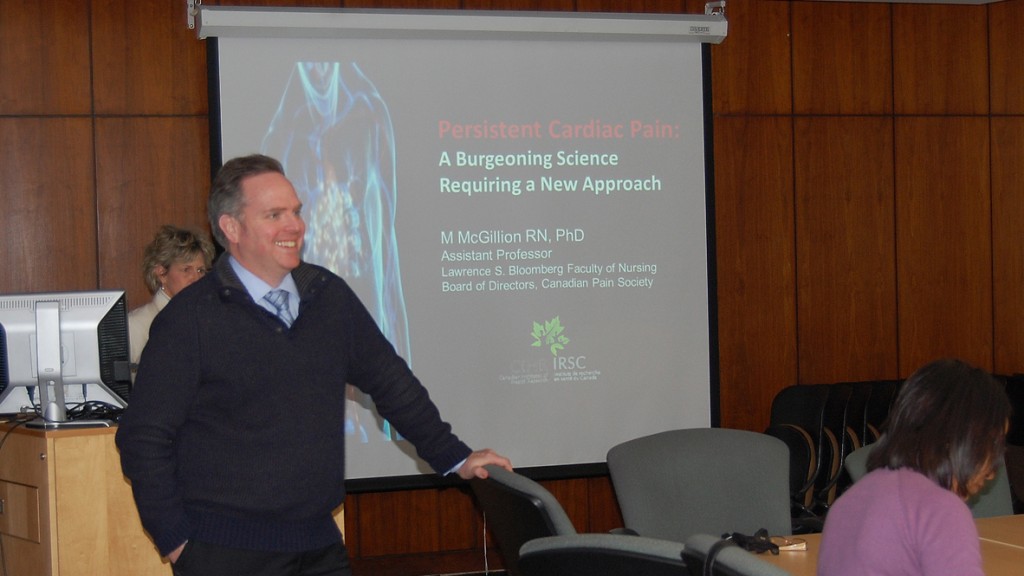Heavy snowfall and grim weather conditions did not deter invited alumni from attending a lecture revealing leading-edge cardiac pain research being conducted at Bloomberg Nursing. Internationally recognized persistent cardiac pain specialist, Dr. Michael McGillion gave a summary of his findings on Tuesday, January 22, 2013 at the final Alumni Lifelong Learning Series.
The seminar was attended by a number of alumni from many disciplines spanning cardiology, internal medicine, neurology and psychology. The lunchtime talk, sponsored by Manulife Financial, explored Persistent Cardiac Pain: A Burgeoning Science Requiring a New Approach. The lecture featured critical discussion amongst peers and colleagues to address disconnects in patient care when treating refractory angina (RFA).
“The Learning Series was a great opportunity to take the temperature of a cross-section of clinicians and present where the science of persistent cardiac pain is at and where it needs to go,” said Dr. McGillion. “Some of the great ideas discussed could very well become a reality in future research and treatment.”
Difficult to diagnose and treat, persistent forms of cardiac pain are major challenge. Often, health care professionals cannot find tangible evidence to support symptoms and inadvertently misdiagnose patients. People suffering persistent forms of cardiac pain continually revisit emergency departments and report chronic cardiac pain when the underlying problem, heart disease, has been ‘fixed’, and the cycle continues. Through his influential research, which developed Canada’s first guidelines on RFA management and his participation as a guest editor for the Canadian Journal of Cardiology’s (CJC) inaugural supplement dedicated to persistent cardiac pain, Dr. McGillion has helped shine light on this issue.
“Persistent cardiac pain is a multi-dimensional problem that spans a number of specialities that need to be harmonized to provide the best patient care,” said Dr. McGillion. “The professionals in these specialities who attended gave key perspectives in recounting their patient stories and sharing their thoughts on the need to create that harmony in the greater nursing community.”
Harmony is a common theme in Dr. McGillion’s research, where he has recognized that collaborative and integrated care is what can provide the most improvements in pain, functional status, psychological distress, role functioning and symptom self-management. As the number of Canadians experiencing chronic cardiac pain look for ways to manage this often misdiagnosed condition, addressing the whole and not just the parts, is a key way to help these patients become functional again.
The lecture attracted attendees from clinical fields including cardiovascular surgery, emergency room technicians, and cardio intensive care. Many agreed that there is a real gap in the system, at each of the different points that the patient is treated for this pain. In the discussion, suggestions about unconventional connections on how to link health professionals with the patients, drawing on psychiatry, cardiovascular, psychology and nursing working together planted the seeds of interesting ideas which could lead to future improvements in patient care.
Alumni Lifelong Learning Series is proudly sponsored by Manulife Financial.
